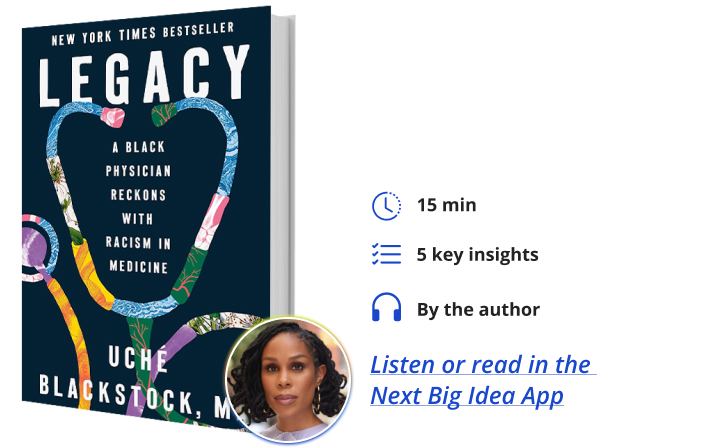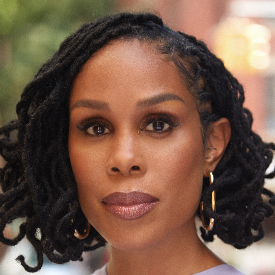Dr. Uché Blackstock is a physician and founder and CEO of Advancing Health Equity. She appears regularly on MSNBC and NBC News and is a former associate professor in the Department of Emergency Medicine and the former faculty director for recruitment, retention, and inclusion in the Office of Diversity Affairs at NYU School of Medicine. Dr. Blackstock received both her undergraduate and medical degrees from Harvard University.
Below, Uché shares five key insights from her new book, Legacy: A Black Physician Reckons with Racism in Medicine. Listen to the audio version—read by Uché herself—in the Next Big Idea App.

1. Just over 2 percent of physicians in the U.S. are Black women.
I consider myself, my twin sister, and our mother to be unicorns. Just over two percent of physicians in the United States are Black women, while Black Americans represent 13 percent of the population. To have three Black women physicians in one family is incredibly rare. To be part of the first Black mother-daughter legacy graduates from Harvard Medical School is even rarer. I’m incredibly proud of our accomplishments, even prouder of my mother’s given that she came from very humble beginnings. She was raised by a single mother on public assistance and never met a Black physician as a child.
At the same time, it’s frustrating that we are still celebrating “firsts” at this point in history. It just shows how the road to becoming a physician for Black Americans is impeded by multiple interpersonal and systemic barriers. These barriers include limited access to a quality education, mentoring programs, and resources needed to apply and attend college and medical school. Then, there is a whole additional issue of what happens once you find yourself within predominately white institutions.
Unfortunately, these environments often can be inhospitable to us. It’s one of the main reasons why I left a seemingly successful career in academic medicine to start my own consulting firm. I now do health equity work in a way that is authentic to me, where I don’t fear retaliatory actions for speaking truth to power.
2. Delayed or missed diagnoses are more common among people of color.
During my first year of medical school, I had to visit the Emergency Room as a patient.
That experience was incredibly scary and vulnerable, but it was also a powerful teaching moment for me. It helped me to understand what some patients experience when they are not listened to or their concerns are ignored by health professionals.
If you are a patient of color, your chances of misdiagnosis are greater than white patients, and you have higher odds of suffering greater harm from diagnostic errors. This holds true despite educational level of attainment or socioeconomic status.
“While in the ER, I was repeatedly told that I didn’t seem to be in that much pain.”
During multiple ER visits to my own medical school for severe abdominal pain, my appendicitis was missed. While in the ER, I was repeatedly told that I didn’t seem to be in that much pain. I was also questioned multiple times about my sexual history. My appendix eventually ruptured, I had to have abdominal surgery, and I ended up having post-operative complications. I had to stay out of school on sick leave for almost a month. It could have cost me my life.
From that experience, I learned how important it is for all health professionals to actively listen to our patients and to take their concerns seriously.
3. There are historical reasons why Black patients face multiple barriers when it comes to receiving care.
There are very deep historic and systemic roots to how Black patients are treated when seeking care. These roots stretch back to slavery, a societal institution that was falsely based on the notion that Black people were biologically inferior to other races. Enslaved Black people were experimented on, without their consent, and traumatized during slavery to help the medical establishment make important discoveries that benefitted all of society.
They were often put on display in medical school lecture halls, and even textbooks included myths that Black people were biologically different. Those notions and myths have been perpetuated for centuries and still infiltrate our medical education curricula.
Health professionals can perpetuate care inequity by not listening to Black patients or minimizing their complaints. This results in inadequate treatment of pain or symptoms. Health professionals also do a disservice to Black patients by not properly investigating the source of their symptoms and not making the correct diagnosis. If pain goes untreated, people experience physical, emotional, and psychological distress.
We have seen these stories play out even in the mainstream media with famous or well-known Black people, like Serena Williams and Beyoncé Knowles. Often, because of these unpleasant and disrespectful experiences with health professionals, Black patients become distrustful of healthcare institutions and decide not to seek care when they need it, risking their health and well-being.
4. The COVID pandemic exposed deep inequities in our healthcare system.
While the COVID-19 pandemic has caused devastating losses and trauma for many communities, the silver lining was how it unearthed deeply rooted inequities within our healthcare system and other social institutions.
Academics had been having these conversations in their own siloes for decades, but now we were discussing them in the mainstream media. COVID showed us how the social determinants of health—education, employment, housing, access to food, transportation, and access to healthcare—directly impact the health of our communities. Additionally, we could see in real-time how systemic racism was a driving force of those social determinants of health.
“COVID showed us how the social determinants of health directly impact the health of our communities.”
For example, I knew in March 2020 that Black communities and other communities of color would be disproportionately impacted because we lived in chronically disinvested communities due to historically racist practices and policies. Black people are more likely to be service workers and essential workers, because of occupational segregation, placing us at higher risk of being exposed to the coronavirus.
We are less likely to have access to employer-sponsored health insurance, paid sick and family leave, and culturally responsive care. We are more likely to live in overcrowded, multi-generational housing.
All these factors placed our communities at higher risk of being infected, hospitalized, and dying from COVID. Our leaders are finally having policy conversations about health equity and how we can embed equity into social, economic, and health policies to prevent further harm to marginalized communities.
5. Racial health inequities are worsening despite advances in innovation, research, and technology in healthcare.
We need to connect the dots for a broad audience, including policymakers and institutional leaders, to help them understand why, despite significant advances in medical innovation, research, and technology, we are still seeing a worsening of racial health inequities.
Many people don’t know or understand why the Black maternal mortality crisis is getting worse. Black birthing people are 3 to 4 times more likely to die from pregnancy-related complications than their white counterparts. Black babies are more than twice as likely to die in their first year of birth than white babies. There is a wider disparity now than 15 years before the end of slavery. But why?
The answer is simple: interpersonal and systemic racism.
Until our social institutions, leaders, and communities reckon with the harm that racism continues to cause—and respond appropriately through equitable practices and policies—this country will continue to see these appalling differences in health outcomes between racial demographic groups.
There is a horrific history of medical racism that still impacts us today. Learning about this history can be one way to improve healthcare for everybody. Understanding the history of medical experimentation on enslaved Black people, or how the Flexner report of 1910 led to the closure of historically Black medical schools at the turn of the 20th century, or how redlining and other discriminatory housing policies have detrimentally impacted Black health today is critical to helping us find solutions.
To listen to the audio version read by author Uché Blackstock, download the Next Big Idea App today:
































